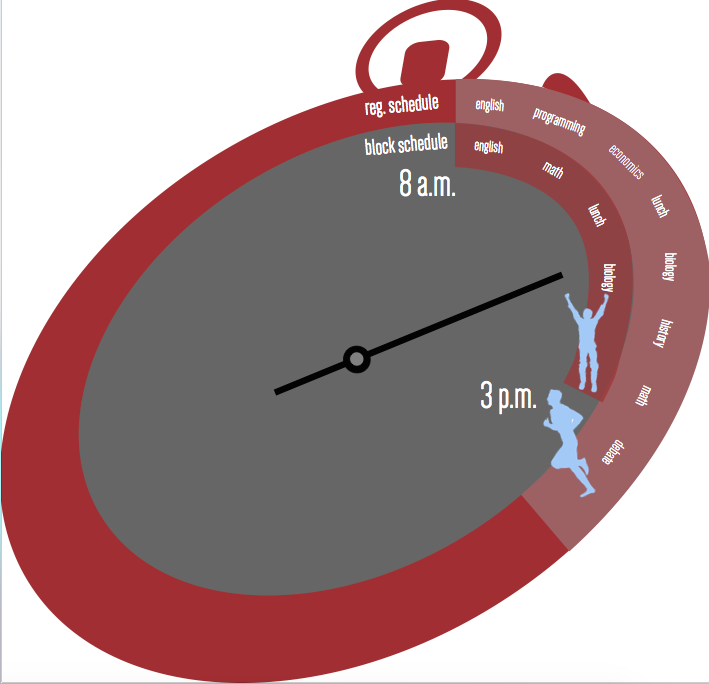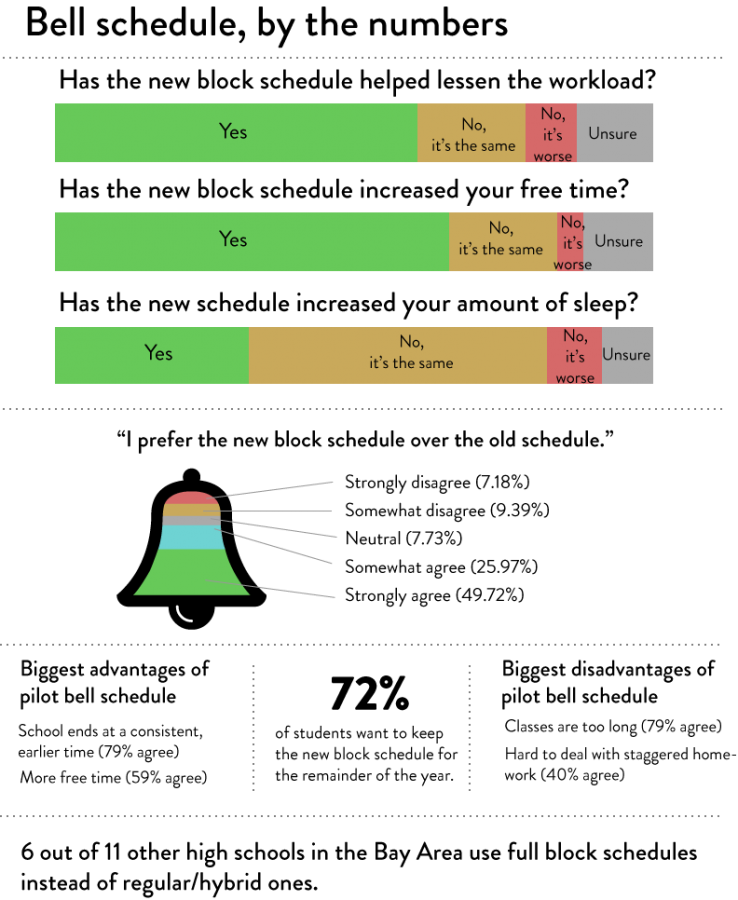Saved by the (new) bell: pilot block schedule reduces workload, students’ stress
February 4, 2016
Upper school students entered a month-long trial period in January for a new block bell schedule.
The weekly block schedule consists A, B, C and D days in which class periods begin at 8 a.m. and end at 2:50 p.m. A and C days have four hour and 20 minute classes and separate 50 minute lunch periods; B and D days have three classes with a long lunch. Sports practices now start later and at the same time each day. In addition, the original five minute passing periods have been extended to 10 minutes, allowing more students to arrive at classes in a timely manner.
“I’m hearing things like, ‘I’ve been at Harker since forever, and now I’m sleeping at night because my homework’s getting done,” Upper School Division Head Butch Keller said. “Or, ‘It’s really nice to be able to go to the bathroom,’ or ‘It’s really nice to get to class a couple minutes early and talk to my teacher.’”
The new block schedule was instituted to provide a calmer environment for students and faculty and mirrors other local schools’ bell schedules.
Several students find that they are less stressed due to a lighter workload, as they have two nights to complete assignments and longer periods.
“It’s good that we have more time to do homework because even though they’re allowed to assign more homework to us, we have a lot more time,” Viveka Saraiya (9) said.
Other students cited the longer periods as a negative aspect of the new schedule, solely concentrating on the academic lives of students.
“First, if you miss classes, it’s horrible to make up work. Second, a lot of teachers aren’t prepared for the new bell schedule, so the way they schedule their curriculum isn’t enough in order to keep students engaged,” Michael Tseitlin (11) said. “Also, especially in debate and other after school activities, because the meeting times are so spaced out, there’s less free time and less leniency.”
The bell schedule pilot will be extended by two weeks, and bell schedule committees will decide whether to keep the schedule for the rest of the semester or institute it at the beginning of the next academic year.
This piece was originally published in the pages of the Winged Post on Jan. 27, 2016




![LALC Vice President of External Affairs Raeanne Li (11) explains the International Phonetic Alphabet to attendees. "We decided to have more fun topics this year instead of just talking about the same things every year so our older members can also [enjoy],” Raeanne said.](https://harkeraquila.com/wp-content/uploads/2025/10/DSC_4627-1200x795.jpg)


















![“[Building nerf blasters] became this outlet of creativity for me that hasn't been matched by anything else. The process [of] making a build complete to your desire is such a painstakingly difficult process, but I've had to learn from [the skills needed from] soldering to proper painting. There's so many different options for everything, if you think about it, it exists. The best part is [that] if it doesn't exist, you can build it yourself," Ishaan Parate said.](https://harkeraquila.com/wp-content/uploads/2022/08/DSC_8149-900x604.jpg)




![“When I came into high school, I was ready to be a follower. But DECA was a game changer for me. It helped me overcome my fear of public speaking, and it's played such a major role in who I've become today. To be able to successfully lead a chapter of 150 students, an officer team and be one of the upperclassmen I once really admired is something I'm [really] proud of,” Anvitha Tummala ('21) said.](https://harkeraquila.com/wp-content/uploads/2021/07/Screen-Shot-2021-07-25-at-9.50.05-AM-900x594.png)







![“I think getting up in the morning and having a sense of purpose [is exciting]. I think without a certain amount of drive, life is kind of obsolete and mundane, and I think having that every single day is what makes each day unique and kind of makes life exciting,” Neymika Jain (12) said.](https://harkeraquila.com/wp-content/uploads/2017/06/Screen-Shot-2017-06-03-at-4.54.16-PM.png)








![“My slogan is ‘slow feet, don’t eat, and I’m hungry.’ You need to run fast to get where you are–you aren't going to get those championships if you aren't fast,” Angel Cervantes (12) said. “I want to do well in school on my tests and in track and win championships for my team. I live by that, [and] I can do that anywhere: in the classroom or on the field.”](https://harkeraquila.com/wp-content/uploads/2018/06/DSC5146-900x601.jpg)
![“[Volleyball has] taught me how to fall correctly, and another thing it taught is that you don’t have to be the best at something to be good at it. If you just hit the ball in a smart way, then it still scores points and you’re good at it. You could be a background player and still make a much bigger impact on the team than you would think,” Anya Gert (’20) said.](https://harkeraquila.com/wp-content/uploads/2020/06/AnnaGert_JinTuan_HoHPhotoEdited-600x900.jpeg)

![“I'm not nearly there yet, but [my confidence has] definitely been getting better since I was pretty shy and timid coming into Harker my freshman year. I know that there's a lot of people that are really confident in what they do, and I really admire them. Everyone's so driven and that has really pushed me to kind of try to find my own place in high school and be more confident,” Alyssa Huang (’20) said.](https://harkeraquila.com/wp-content/uploads/2020/06/AlyssaHuang_EmilyChen_HoHPhoto-900x749.jpeg)














